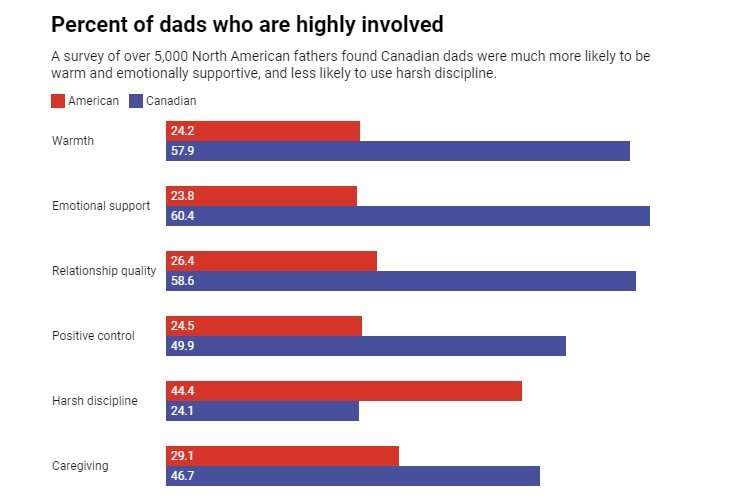Why Canadian dads are more involved in raising their kids than American fathers

Thirty-five years ago, Canadian and American dads were doing a similar amount of child rearing, relative to mothers. Surveys from the mid 1980s showed that Canadian men spent that Canadian women spent on child care, and American men spent that American women spent on child care.
Today, there are significant gaps in fathering between Canadians and Americans. Canadian dads taking care of their children than their . For example, Canadian fathers spend an average of 14 hours on child care each week, while American fathers average about 8 hours a week.
As a , I am interested in how social policies affect fatherhood in different countries. I collected data on more than 5,000 men in the two nations from 2016 to 2018 for my upcoming book on the similarities and differences between American and Canadian dads. This data looked at how dads interacted with their children—whether they acted warmly and affectionately, if they provided emotional support and how they disciplined their children.
My data shows Canadian dads were much more likely to show warmth, provide emotional support, engage in caregiving and use positive discipline. In fact, American dads outperformed their Canadian counterparts on only one of the survey measures—the use of spanking and other harsh disciplinary tactics.
Why have Canadian fathers pulled ahead of American fathers in caring for and showing affection toward their children? I believe the answer lies, in part, with four types of social policies in Canada that help fathers be more engaged at home.
1. Family leave
When it comes to family policy, there are major differences between the U.S. and Canada.
Canada has guaranteed paid family leave for mothers and fathers. As part of their employment insurance program, Canadian parents get 35 weeks of shared paid benefits, paid at 55% of regular pay. On top of that, fathers get five exclusive weeks of leave.
Meanwhile, the that doesn't guarantee maternity leave, and one of three rich countries—along with Oman and the United Arab Emirates—without a paternity leave option.
Studies from across the world consistently show that men who take paternity leave tend to be , have with family members and help their more quickly.
2. Social inequality
Stagnant incomes, high levels of economic inequality and financial instability have led many American men to . In my survey, a third of the American respondents work 50 hours or more a week, compared to just one-tenth of Canadian participants.
Financial anxieties permeate parenting in the U.S. The increase in —parents who try to build impeccable resumes for their kids, filled with extracurricular activities, advanced courses and awards—is an effort by middle-income families .
Such parenting patterns are , a country with more accessible elite and less .
The Canada Child Benefit further alleviates financial anxiety for parents. Unlike child tax credits in the U.S., which were traditionally paid with tax returns, Canada delivers its tax credit in monthly payments to low- and middle-income families with children. The program has since its introduction in 2017. The U.S. just rolled out a similar temporary program in July 2021.
3. Gender inequality
Fathers tend to be more involved parents in nations with higher levels of gender equality. When women are , fathers provide more physical care to children, are warmer and more emotionally supportive parents, and use less harsh discipline. This is likely caused by more explicit and enforceable expectations about equal partnership between co-parents.
Canada is a more gender-equal country than the U.S. In 2019, listed Canada as the 19th most egalitarian nation in the world. The U.S. was 46th. Canada outpaced the U.S. on measures of female health, political power, education and economic empowerment. Solidifying the expectation that dads be highly involved co-parents, these greater levels of gender equality may be a significant reason Canadian fathers outperform their American counterparts.
4. Health care
Even policies that seemingly have little to do with parenting have, in reality, a major impact on how men interact with their children. This includes Canada's single-payer, provincially administered, universal health care system.
Analyses in my forthcoming book, for example, show that poor physical health has much weaker negative effects on men's parenting in Canada than in the U.S. This suggests that the U.S. health care system's , drain individuals' time, energy and resources—making fathering more difficult. The problem is compounded when children have health issues as well.
As society emerges from the COVID-19 pandemic, data suggests that a more comprehensive family policy would benefit American fathers, mothers and children. Doing so can ease the especially difficult and help remove structural barriers that make it hard for fathers to be highly involved and engaged parents. Canada may provide the United States with a useful example on how to implement supportive family policies.
Provided by The Conversation
This article is republished from under a Creative Commons license. Read the .![]()

















